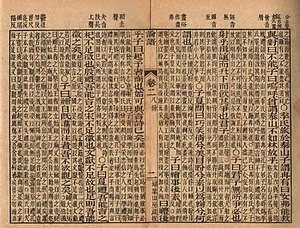Analects: Difference between revisions
Content added Content deleted
m (1 revision imported: importing my pages from FANDOM) |
(added infobox book) |
||
| Line 1: | Line 1: | ||
{{work}} |
{{work}} |
||
{{Infobox book |
|||
| ⚫ | |||
| title = Analects |
|||
| original title = 論語 |
|||
| image = Rongo Analects 02.jpg |
|||
| ⚫ | |||
| author = Confucius |
|||
| central theme = |
|||
| elevator pitch = |
|||
| genre = |
|||
| publication date = 475–221 BCE |
|||
| source page exists = yes |
|||
| wiki URL = |
|||
| wiki name = |
|||
}} |
|||
| ⚫ | The '''''Analects''''' or "Selected Sayings", is a collection of sayings and comments shared between Chinese philosopher Confucius/Kong Fuzi, and is considered essential to the study of the philosophies he advocated alongside the [[Four Books and Five Classics]]. While brief by Western standards, and while many of the comments would fall under "common sense" guidelines to some, they formed the basis of what became the bedrock of Chinese social and moral values for millennia. |
||
| ⚫ | The ''Analects'' or "Selected Sayings", is a collection of sayings and comments shared between Chinese philosopher Confucius/Kong Fuzi, and is considered essential to the study of the philosophies he advocated alongside the [[Four Books and Five Classics]]. While brief by Western standards, and while many of the comments would fall under "common sense" guidelines to some, they formed the basis of what became the bedrock of Chinese social and moral values for millennia. |
||
{{hardline}} |
|||
{{tropelist}} |
{{tropelist}} |
||
* [[Agnosticism]]: A variation was advocated. While the supernatural was to be respected, Confucius saw religion more as a means of regulating public conduct than for its supernatural aspects. |
* [[Agnosticism]]: A variation was advocated. While the supernatural was to be respected, Confucius saw religion more as a means of regulating public conduct than for its supernatural aspects. |
||
| Line 19: | Line 28: | ||
{{reflist}} |
{{reflist}} |
||
<!-- If you are not comfortable defining categories for pages, leave everything after this line as it is. If you are comfortable defining categories for pages, add categories after this line and delete the "Pages Needing Categories" category. --> |
|||
[[Category:{{PAGENAME}}]] |
[[Category:{{PAGENAME}}]] |
||
[[Category:Confucius]] |
[[Category:Confucius]] |
||
Revision as of 01:37, 19 June 2021
 A page from the original Chinese version | |
| Original Title: | 論語 |
|---|---|
| Written by: | Confucius |
| Central Theme: | |
| Synopsis: | |
| First published: | 475–221 BCE |
| More Information | |
| Source: | Read Analects here |
The Analects or "Selected Sayings", is a collection of sayings and comments shared between Chinese philosopher Confucius/Kong Fuzi, and is considered essential to the study of the philosophies he advocated alongside the Four Books and Five Classics. While brief by Western standards, and while many of the comments would fall under "common sense" guidelines to some, they formed the basis of what became the bedrock of Chinese social and moral values for millennia.
Tropes used in Analects include:
- Agnosticism: A variation was advocated. While the supernatural was to be respected, Confucius saw religion more as a means of regulating public conduct than for its supernatural aspects.
- Canon Immigrant: Originally considered a mere commentary on the Five Classics, it is now considered equal to them.
- Exactly What It Says on the Tin: The meaning of "Analects" is "selected sayings", which is the entirety of its contents.
- Fanon: Even within China, there are several different theories on when and how it was compiled.
- The Charmer: While artful and erudite speaking so as to win over others was encouraged, Confucius advised one not overdo this, lest a false impression of the speaker's actual character be given.
- The Golden Rule: Proposed "Do not do to others what you would not like done to yourself", which is similar to the one advocated by Christ several hundred years later.
- Reasonable Authority Figure: His comments on rulers is that they should be one of these to encourage adherence to the law.
- The Smart Guy: Becoming one of these was a conscious aim of the sayings of the Analects.